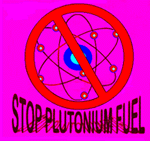|
NRC letter officially terminating the construction authorization for the Plutonium Fuel Fabrication Facility at Savannah River Site
posted Feb. 28, 2019: In 1997, the Blue Ridge Environmental Defense League launched the Southern Anti-plutonium Campaign, the goal of which was to stop the plutonium fuel factory at the Savannah River Site in South Carolina and prevent the expansion of the worldwide plutonium energy economy. Over the decades, we challenged Dominion’s and Duke Energy’s plans to use the fuel at nuclear power plants. Our campaign allied with non-governmental organizations in Russia, Great Britain, France, Japan as well as the US. BREDL spoke at many public forums including Augusta, Charlotte, Washington, Moscow, Saratov and Krasnoyarsk and at the G-8 in Okinawa. We placed the issue before the United Nations at Nuclear Non-proliferation Treaty meetings in New York. The February 8, 2019 termination of the construction authorization by the Nuclear Regulatory Commission is the final domino to fall in this dangerous and expensive project. Five billion taxpayer dollars were spent. Final construction cost estimates ballooned to $17 billion, over 400% of the original estimate. But the project was defeated, thanks to the many who acted on the belief that “one person speaking alone may not be heard, but many people speaking with one voice cannot be ignored.”
NRC Feb. 8 Letter
|
